人教版九年级上册Unit 1 How can we become good learners. Section B(2a-2e)(共58张PPT)
文档属性
| 名称 | 人教版九年级上册Unit 1 How can we become good learners. Section B(2a-2e)(共58张PPT) |
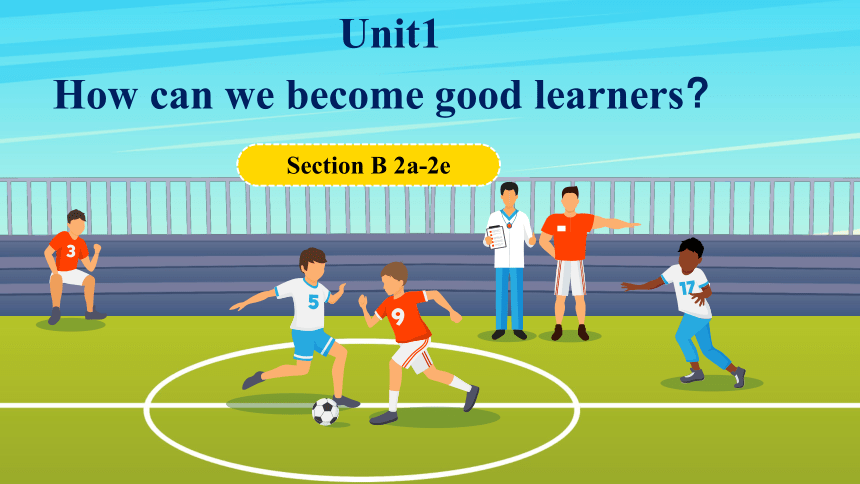
|
|
| 格式 | pptx | ||
| 文件大小 | 7.6MB | ||
| 资源类型 | 教案 | ||
| 版本资源 | 人教新目标(Go for it)版 | ||
| 科目 | 英语 | ||
| 更新时间 | 2023-01-25 00:00:00 | ||
图片预览

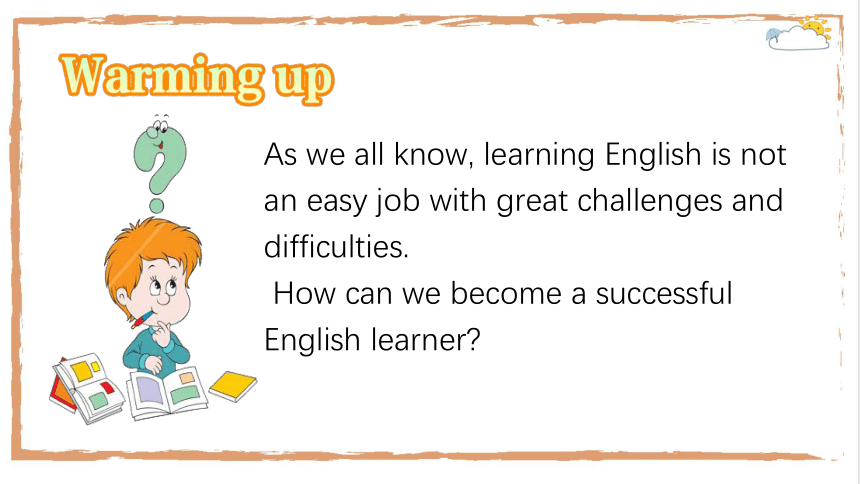
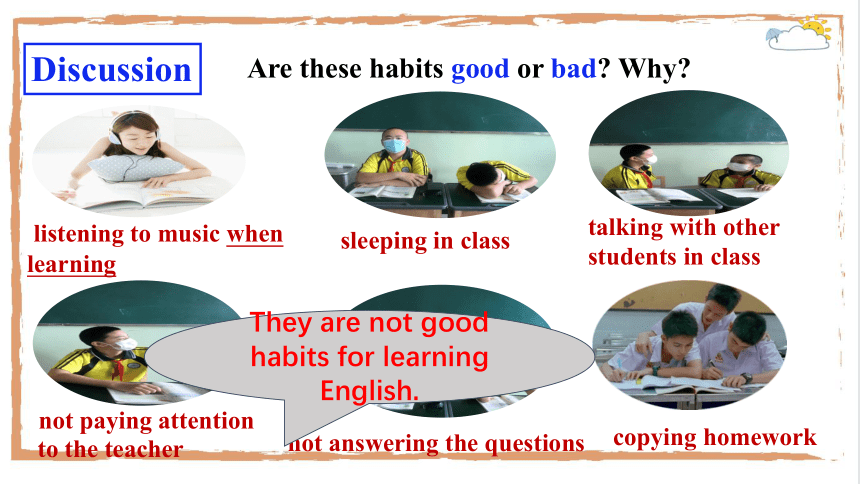
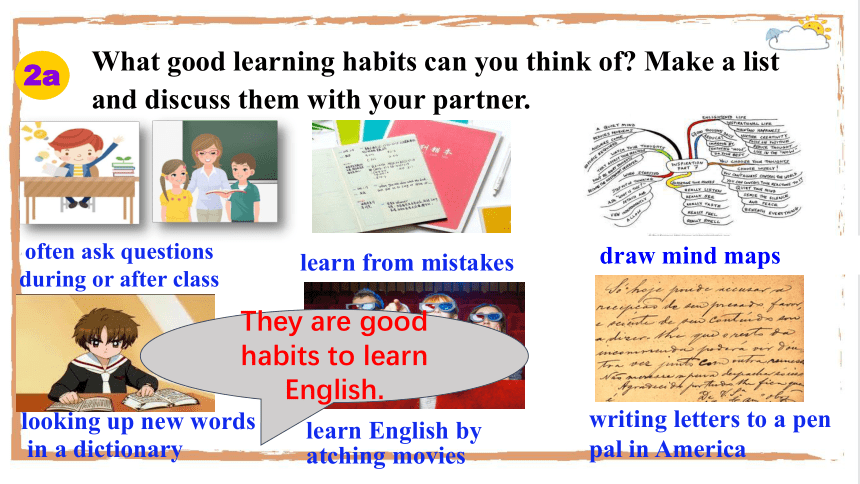
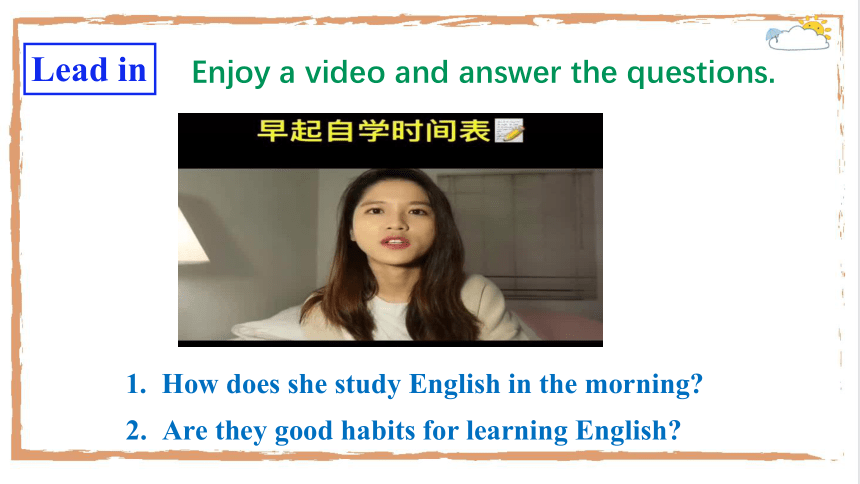

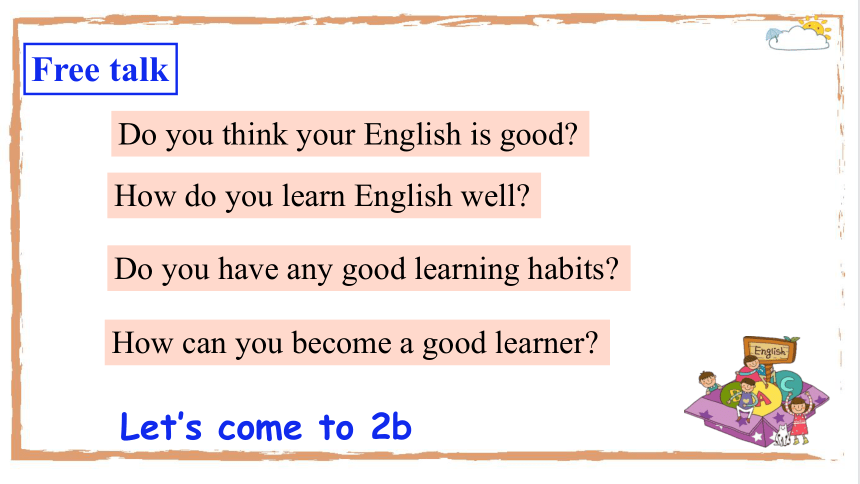

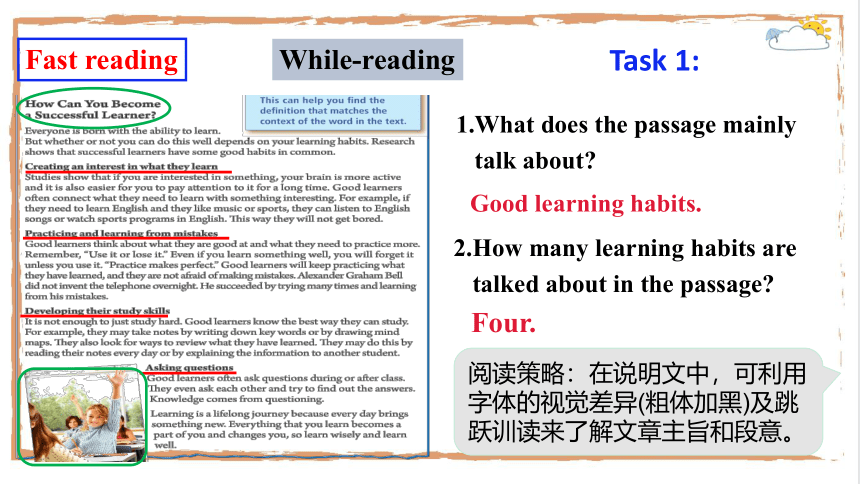
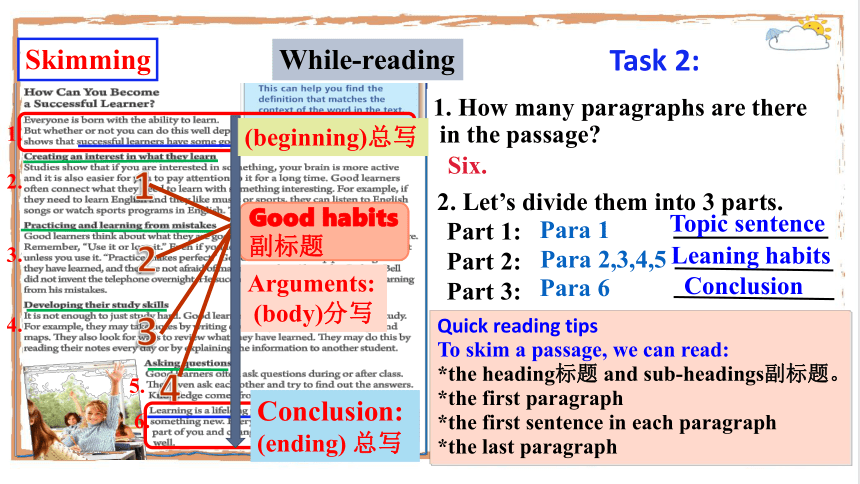
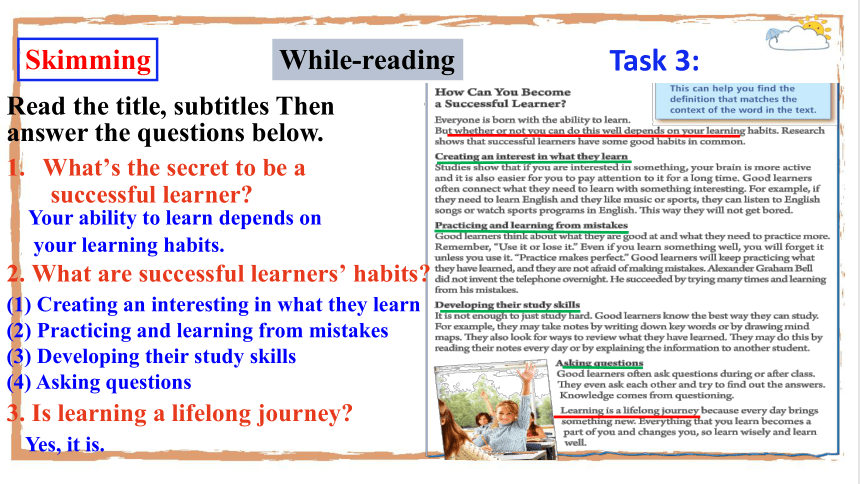
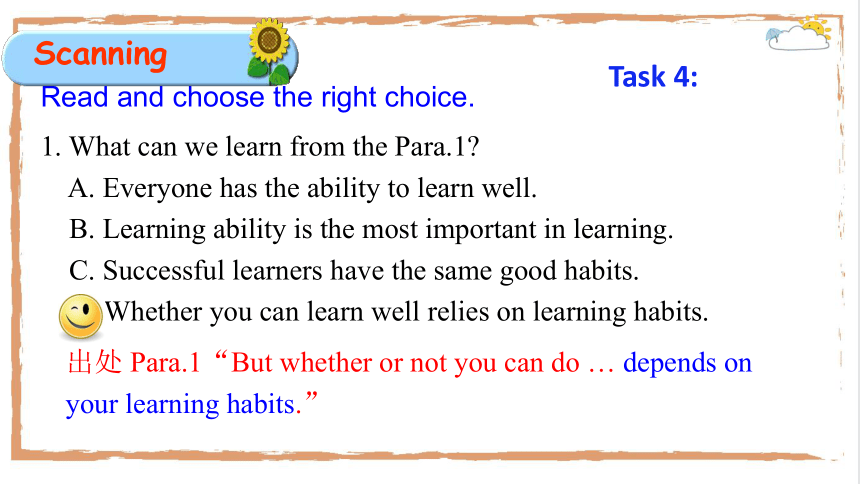
文档简介
(共58张PPT)
Unit1
How can we become good learners?
Section B 2a-2e
As we all know, learning English is not an easy job with great challenges and difficulties.
How can we become a successful English learner
Discussion
Are these habits good or bad Why
listening to music when learning
sleeping in class
talking with other
students in class
not paying attention
to the teacher
not answering the questions
copying homework
They are not good habits for learning English.
What good learning habits can you think of Make a list and discuss them with your partner.
2a
often ask questions
during or after class
learn from mistakes
draw mind maps
looking up new words
in a dictionary
learn English by
atching movies
writing letters to a pen
pal in America
They are good habits to learn English.
Lead in
Enjoy a video and answer the questions.
How does she study English in the morning
Are they good habits for learning English
How does she study English in the morning
She studies English by memorizing new words and useful
expressions, doing listening practice and reading.
Are they good habits for learning English
Yes, I think so.
Do you think your English is good
How do you learn English well
Do you have any good learning habits
Free talk
How can you become a good learner
Let’s come to 2b
New words
Listen and repeat.
born
be born with
ability
create
brain
active
attention
pay attention to
connect
connect...with
overnight
review
knowledge
lifelong
wisely
v. 出生 adj. 天生的
天生具有
n. 能力;才能
v. 创造;创建
n. 大脑
adj. 活跃的;积极的
n. 注意;关注
注意;关注
v. (使)连接;与.......有联系
把......和.......连接或联系起来
adj. 一夜之间;在夜间
v. & n. 回顾;复习
n. 知识;学问
adj. 终身的;毕生的
adv. 明智地;聪明地
While-reading
Fast reading
Task 1:
What does the passage mainly
talk about
Good learning habits.
2.How many learning habits are
talked about in the passage
Four.
阅读策略:在说明文中,可利用字体的视觉差异(粗体加黑)及跳跃训读来了解文章主旨和段意。
While-reading
Skimming
Task 2:
1. How many paragraphs are there
in the passage
1.
2.
3.
4.
6.
5.
Six.
2. Let’s divide them into 3 parts.
Part 1:
Part 2:
Part 3:
Para 1
Para 2,3,4,5
Para 6
Topic sentence
1
2
3
4
Good habits
副标题
Leaning habits
Conclusion
(beginning)总写
Arguments:
(body)分写
Conclusion:
(ending) 总写
Quick reading tips
To skim a passage, we can read:
*the heading标题 and sub-headings副标题。
*the first paragraph
*the first sentence in each paragraph
*the last paragraph
While-reading
Skimming
Task 3:
Read the title, subtitles Then answer the questions below.
What’s the secret to be a
successful learner
Your ability to learn depends on
your learning habits.
2. What are successful learners’ habits
(1) Creating an interesting in what they learn
(2) Practicing and learning from mistakes
(3) Developing their study skills
(4) Asking questions
3. Is learning a lifelong journey
Yes, it is.
1. What can we learn from the Para.1
A. Everyone has the ability to learn well.
B. Learning ability is the most important in learning.
C. Successful learners have the same good habits.
D. Whether you can learn well relies on learning habits.
Read and choose the right choice.
出处 Para.1“But whether or not you can do … depends on your learning habits.”
Scanning
Task 4:
2. How can a sports lover learn English
A. By listening to English songs to learn English.
B. By watching sports programs in English.
C. By joining more sports clubs.
D. By memorizing more words about sports.
出处 Para.2 “For example, …or sports, they can listen to English songs or watch sports programs...”
3. Why did Alexander Graham Bell succeed
A. Because he invented the telephone overnight.
B. Because he learned from his mistakes.
C. Because he tried many times.
D. Both B and C.
出处 Para.3 “…did not invent the telephone overnight…
by trying many times and learning from his mistakes.”
4. What study skills are NOT mentioned in the passage
A. Taking notes by writing down key words or drawing mind maps.
B. Doing more practice to strengthen knowledge.
C. Reading notes every day.
D. Explaining information to another students.
出处 Para.4 “For example, they may take notes by writing … to another student.”
5. Which of the following is wrong
A. The writer encourages the reader to learn wisely.
B. Once you have the four good learning habits, you
will be successful in your career.
C. You will forget what you learnt quickly if you
don’t use them.
D. Asking questions is good for learning knowledge.
n. 事业
Para 1
Everyone is born with the ability to learn. But whether or not you can do this well depends on your learning habits. Research shows that successful learners have some good habits in common.
1. According to the writer, what kind of ability is everyone born with
Everyone __ ____ ____ the ability to_____.
2. How can people learn well
It depends on ______ ______.
is born with learn
learning habits
3. What does the underlined word “this” refer to
The ability to learn.
Careful Reading
While-reading
Careful reading
Task 1:
Read Para 1 and answer the questions.
1. According to the writer, what kind of ability is everyone born with
2. How can people learn well
3.What do successful learners have in common
Everyone is born with the ability to learn.
It depends on learn habits.
They have some good habits in common.
While-reading
Careful reading
Task 2:
Read Para 2 fill in the chart.
Creating an interest in what they learn Why The brain is ____ _______.
It’s _______to ____ _______ ______it for a long time.
How _______what they need to learn ____ __________ _________.
Example If they need to learn English and they like ____ _____ _____, they can listen to ______ _______or watch ________ ________in English.
more active
easier
pay attention to
Connect
with something interesting
music or sports
English songs
sports programs
While-reading
Careful reading
Task 3:
Read Para 3 and give “T” or “F” or answer the questions.
1.If you are good at something, you don’t need to practice more.
2.Good learners are not afraid of making mistakes, they always keep practicing.
3.Who invented the telephone How did he succeed
F
Use it or lose it.
Practice makes perfect.
T
Alexander Graham Bell.
He succeed by trying many times and learning from his mistakes.
While-reading
Careful reading
Task 4:
Read Para3 again carefully and complete the table.
sayings supporting sentences
Use it or lose it. ____ __you learn something well,
you will forget it _____you use it.
Practice makes perfect. Good learners will _____ _______
what they have learnt.
unless
Even if
keep practicing
Alexander Graham Bell
(亚历山大·格雷厄尔·贝尔)
Bell was born in England in
1847. He is an American
inventor and entrepreneur
(企业家). He is known as the father of the telephone and he invented the telephone in 1876.
While-reading
Careful reading
Task 5:
Read Para 4 carefully and finish the mind map.
How to develop
their study skills
They may ________ by writing down _________or by drawing___________.
They ________ ways to________ what they have learned.
They do this by ___________ or by ________ the information ___ another student.
take notes
key words
mind maps
look for
review
reading notes
explaining
to
While-reading
Careful reading
Task 6:
Read the last two Paras and
answer the questions.
Why do we think knowledge
comes from questioning
2. Do you agree that learning is a
lifelong journey Why or why not
3. Why do we need to learn wisely
and learn well
Because good learners often ask questions
during or after class. They even ask each other
and try to find out answers.
Yes. Because every day brings something new.
Because everything that you learn becomes
a part of you and changes you..
While-reading
Careful reading
Task 7:
2c
Read the passage again and answer the questions.
Does the writer think that everyone is born with the ability to learn well Do you agree Why or why not
No, he/she doesn’t. Yes, I do. Because whether or not one can learn well depends on his/ her learning habits.
2. Why is it a good idea to connect something you need to learn with something you are interested in
This is because studies show that if you are interested in something, your brain is more active and it is also easier for you to pay attention to it for a long time. You will also not get bored.
3. What do the sayings “Use it or lose it” and “Practice makes perfect” mean Do you agree with them
(1) Use it or lose it: Even if we learn something well, we will forget it unless we use it.
(2) Practice makes perfect: We should keep practicing what we have learned so that we can be good at it.
(3) Yes, I do.
4. Do good learners learn from mistakes, or are they afraid of making mistakes
Good learners learn from mistakes, and they are not afraid of making mistakes.
5. What study skills does the writer talk about Do you have those study skills
Taking notes by writing down key words or by drawing mind maps, looking for ways to review what has been learned, for example, doing this by reading notes every day or by explaining the information to another student.
Yes, I do./ No, I don’t.
6. Do you agree that learning is a lifelong journey Why or why not
Yes, I do. Because every day brings something new.
Summary
____ can you b________ a successful learners All of you are ____ ____ the ability to learn. If you want to do this well, it ______ on your learning _____. Here are some good learning habits for you. First, you should c_______ an interest in what you learn. Because your brain will be _____ if you are interested in something. And it can help you ___ _______ ___ it for a long time. Also , we need to ______ knowledge with our interests. Second, you should practice and learn from the _______. Don’t be ______ of making mistakes. Remember , p________ makes p______. No one can succeed o________ without working hard. What’s more, you need to _______ your learning skill. You should find the best______, such as t_____ notes and r__________ what they have learned. Of course, it’s important to ___ questions, because ___________comes from questioning. Anyway, learning is a ____________ journey . Just learn w_____ and learn well.
How
ecome
born
with
depends
habits
reate
active
pay
attention
to
connect
mistakes
afraid
ractice
erfect
vernight
develop
way
aking
eview
ask
knowledge
lifelong
isely
A Good Learner
Attitude
Ways
Habits
How to Be a Better Learner
Topic
Conclusion
Firstly/ Secondly/Also... /What’s more,…
On the one hand…On the other hand,…
For example...
In a word/All in all, ...
Reasons
Example (s)
I have some advice on being a better learner.
Be a good writer!
Do you think you are a good learner
What learning habits do you think are useful Discuss with your group and share your ideas with the class.
A: I think another way to become a successful learner is by trying to think about the same thing in different ways.
B: I agree. I believe that ...
2e
Post-reading Task
looking up new words
in the dictionary
correcting mistakes in time
asking the teacher
for help
taking notes
be active in class
listening to the teacher carefully
some good habits
Being attentive in class.
Having an interest in the subject.
Reading the relevant text before a lesson.
Reviewing what has been taught after each lesson.
Asking questions in class.
Having a study partner/ buddy.
be active in thinking
review well what you have learned
Connect something new with knowledge and experience you already have
Other good learning habits
habits How good learners do proofs examples
Your brain is more active;
It is easier for you to pay attention to it for a long time.
Creating an interesting in what they learn
Good learners often connect what they need to learn with something interesting.
They can listen to English songs or watch sports programs in English.
Post-reading Fill in the blanks .
写出一种你认为成功的学习方法
Your way: ____________
Reason:_____________
Example:____________
仿写训练
First, use time wisely. Before class, you should preview the textbook with special care and be ready to respond to questions. When in class, listening carefully and thinking positively. After class, you ought to finish your homework first instead of watching TV or playing computer games first.
Second, learn to communicate more with teachers, You’d better try to treat the teacher as a friend, try to like your teachers.
Last, have a sunny heart. Believe yourself.
To be a better learner, I think the most important thing is to keep working hard. As the saying goes, “Nothing is difficult if you put your heart into it.” Learning wisely is also important. First, you should look for suitable ways like making mind maps and taking notes with key words. Second, it is necessary to have some good habits. For example, you are supposed to make plans and keep them.
Look up the following words from the passage in the dictionary. Then write a sentence for each word.
brain n. connect v. overnight adv.
attention n. review v. knowledge n.
ability n. active adj. wisely adv.
e.g. brain: A good way to train the brain is to do some math exercises every day.
训练大脑
2d
Post-reading Task
connect: This railway line connects Beijing and Guangzhou.
overnight:The actor became famous overnight.
attention: We must pay attention to our pronunciation.
review: We should review the lessons in time.
knowledge:Knowledge comes from questioning.
...
Post-reading Task
1. ...you can do this well depends on your learning habits.
短语词组:depend on/ upon 依据;依赖
depend on sb./ sth. to do sth.
e.g.
We depend entirely on donations from the public. 我们完全依赖公众的捐助。
I’m depending on you to get this done.
我指望着你把这件事给办了。
Grammar Focus
2. ... successful learners have some good habits in common.
have sth. in common (with sb./ sth.)(与某人、某物有相同之处)
e.g.
Their methods have a lot in common.
他们的方法有很多相同之处。
Grammar Focus
3. Studies show that if you are interested in something, your brain is more active and it is also easier for you to pay attention to it for a long time.
【高频考点】
be interested in sth./ doing sth. 对...感兴趣的;关心的
(1) –ed : 修饰人,描述人的声音、表情或感受;
(2) –ing :修饰事物,描述事物的状态或性质。
Grammar Focus
【类似形容词】
① interested 感兴趣的
interesting 令人感兴趣的
② disappointed 失望的
disappointing 令人失望的
③ bored 感到无聊的
boring 无聊的
④ excited 兴奋的 ⑤relaxed 放松的
exciting 令人兴奋的 relaxing令人放松的
Grammar Focus
pay (much) attention to 注意;专心;留心
pay no attention to 对(某人的话语)不在意
e.g.
The TV was on but he wasn’t paying much attention to it. 电视开着,可是他没怎么注意看。
You should pay no attention to his stupid words. 别太在意他的蠢话。
Grammar Focus
4. Even if you learn something well, you will forget it unless you use it.
【引导条件状语从句】
unless 连词, “ 除非,如果不” 相当于“if … not” 。
I shall go to the supermarket unless it rains.
= I shall go to the supermarket if it doesn’t rain .
Grammar Focus
5. Everyone is born with the ability to learn.
Grammar Focus
1) be born with “天生具有”,指生来具有某种天分、性格或患有疾病等。
e.g. He was born with a gift for music.
2)ability不可数名词“能力”,其后常接to do,表示“做…的能力”。
e.g.He has the ability to speak English fluently.
6. But whether or not you can do this well depends on your learning habits.
Grammar Focus
★ whether or not... “是否”,用在宾语从句、主语从句。
e.g.Whether or not we’re successful, we can be
sure that we did our best.
★ whether和 if 引导宾语从句,表示“是否”,可以互换。
e.g.Ask him whether/if he can come.
问问他是否来。
★注意在下列情况,只用whether:
a.whether引导的从句常和连词or或or not连用,而if不能;
b.当宾语从句提到首句时,只能用whether,不能用if;
c.whether后可以接动词不定式,if 不能。
Practice: 用whether或 if 填空。
1. ________ it’s true or not, I can’t tell.
2. I don’t know _______ to accept or refuse.
3. I wonder __________ I can get some advice
from you.
Whether
whether
whether/if
Grammar Focus
3. Good learners often connect what they need to learn with something they are interested in.
connect…with…意为“ 把……和……联系起来” 其中connect意为“(使)连接;与……有联系”,其名词形式为connection,意为“连接;关系”。
Please don’t connect this person with that person.
请不要把这个人和那个人联系在一起。
need 在此处为及物动词,意为“需要” 其后跟名词、代词、动词不定式或动词-ing形式。need作实义动词时,既可用于肯定句,也可用于否定句和疑问句,构成否定和疑问句时要借助助动词do/ does/ did。
I need a lot of money now. 我现在很需要钱。
You need to take good care of your mother.
你要好好照顾你妈妈。
4. Good learners think about what they are good at and what they need to practice more.
Think about 意为“考虑”其后接名词、代词、动词-ing 形式或宾语从句。
They are thinking about a serious problem.
他们正在考虑一个严肃的问题。
Be good at “擅长”同义于 do well in “在某方面做得好”
He is good at English.= he does well in English.
5.Even if you learn something well, you will forget it unless you use it.
Even if 意为“即使,尽管”,用于引导让步状语从句,有退一步设想的意味,同义于“even though”。
I’ll help you, even if I must stay up the whole night.
即使熬夜一整晚我也要帮助你。
forget 后直接跟名词、代词、动词不定式或动词-ing 形式,但两者意义完全不同。
forget to do sth. 和 forget doing sth.
forget to do sth. 忘记去做某事
forget doing sth. 忘记做过某事
I forget to turn off the light. 我忘记关灯了。
I forget turning off the light. 我忘记已经关灯了。
6. Knowledge comes from questioning.
question在句子中作动词,是“质疑;质问;提问”的意思。例如:
I just accepted what he told me. I never thought to question it.
当question用作动词,表示对某人或事物进行提问时,是一种十分正式的用法,有“提问;询问;审问”的意思。
The police questioned him for three hours before letting
him go.
The _______ (速度)of the fastest train in China is over 350 kph.
I want to find a ________(搭档) to practice English with.
The number of the students has __________(增加)since last year.
______________ (并非每个人)likes this kind of movie.
She wants to get her computer __________.(修理)
He can’t _____________(发音)some of the words.
partner
speed
Not everyone
increased
repaired
一、根据汉语提示填空。
pronounce
二、单选
一 How are you getting on with your cousin
一 Very well. He is really ________ and joins in all kinds of activities in his
spare time.(宜昌中考)
A. shy B. active C. patient D. careful
2. 一 Li Mei has improved her English a lot since she joined the English club.
一 How ______ she chose to join it at first!
A. quickly B. wisely C. simply D. suddenly
B
B
3. You need to pay attention to ________ as much as possible.
A. speaking B. speak C. speaks D. spoken
4. The poor boy was born _______ a weak heart. We’re going to raise money for
him next week.
A. in B. by C. on D. with
5. A good student connects what he reads _____ what he sees around him.
A. for B. with C. in D. on
A
D
B
6.In recent years the economy of our country _____ rapidly.
A. is increased B. has increased
C. increased D. has been increased
7.There are so many kinds of MP3 in the shop. We can’t decide _______.
A. what to buy B. to buy what
C. which to buy D. to buy which
C
B
8.His trouble is that he always makes mistakes _____ spelling English words.
A. on B. with C. in D. by
9.— Why did your father get a ticket(罚单)
— Because he drove _______ a speed of 80 kilometers an hour in the street.
A. in B. with C. for D. at
10.I’m sorry to tell you that I have no partner ________.
A. to practice English B. to practice English with
C. to practice English in D. practicing English with
C
D
B
三、选词填空(二)
listen, comes, active, mistakes, interesting, wisely, are, unless, key
Studies show that if you are interested in something, your brain is more ______. Good learners often connect what they need to learn with something _________. They can ______ to English songs if they need to learn English and they like music. They think about what they ____ good at, and they are also not afraid of making _______. They think that even if you learn something well, you will forget it _______ you use it. They may take notes by writing down ____ words or by drawing mind maps. They think knowledge ______ from questioning. Learn _______ and learn well.
active
interesting
listen
are
mistakes
unless
key
comes
wisely
Knowledge is power.
There is no end to learning.
Wish you a good learner!
学无止境。
知识就是力量。
Thanks for your attention!
Unit1
How can we become good learners?
Section B 2a-2e
As we all know, learning English is not an easy job with great challenges and difficulties.
How can we become a successful English learner
Discussion
Are these habits good or bad Why
listening to music when learning
sleeping in class
talking with other
students in class
not paying attention
to the teacher
not answering the questions
copying homework
They are not good habits for learning English.
What good learning habits can you think of Make a list and discuss them with your partner.
2a
often ask questions
during or after class
learn from mistakes
draw mind maps
looking up new words
in a dictionary
learn English by
atching movies
writing letters to a pen
pal in America
They are good habits to learn English.
Lead in
Enjoy a video and answer the questions.
How does she study English in the morning
Are they good habits for learning English
How does she study English in the morning
She studies English by memorizing new words and useful
expressions, doing listening practice and reading.
Are they good habits for learning English
Yes, I think so.
Do you think your English is good
How do you learn English well
Do you have any good learning habits
Free talk
How can you become a good learner
Let’s come to 2b
New words
Listen and repeat.
born
be born with
ability
create
brain
active
attention
pay attention to
connect
connect...with
overnight
review
knowledge
lifelong
wisely
v. 出生 adj. 天生的
天生具有
n. 能力;才能
v. 创造;创建
n. 大脑
adj. 活跃的;积极的
n. 注意;关注
注意;关注
v. (使)连接;与.......有联系
把......和.......连接或联系起来
adj. 一夜之间;在夜间
v. & n. 回顾;复习
n. 知识;学问
adj. 终身的;毕生的
adv. 明智地;聪明地
While-reading
Fast reading
Task 1:
What does the passage mainly
talk about
Good learning habits.
2.How many learning habits are
talked about in the passage
Four.
阅读策略:在说明文中,可利用字体的视觉差异(粗体加黑)及跳跃训读来了解文章主旨和段意。
While-reading
Skimming
Task 2:
1. How many paragraphs are there
in the passage
1.
2.
3.
4.
6.
5.
Six.
2. Let’s divide them into 3 parts.
Part 1:
Part 2:
Part 3:
Para 1
Para 2,3,4,5
Para 6
Topic sentence
1
2
3
4
Good habits
副标题
Leaning habits
Conclusion
(beginning)总写
Arguments:
(body)分写
Conclusion:
(ending) 总写
Quick reading tips
To skim a passage, we can read:
*the heading标题 and sub-headings副标题。
*the first paragraph
*the first sentence in each paragraph
*the last paragraph
While-reading
Skimming
Task 3:
Read the title, subtitles Then answer the questions below.
What’s the secret to be a
successful learner
Your ability to learn depends on
your learning habits.
2. What are successful learners’ habits
(1) Creating an interesting in what they learn
(2) Practicing and learning from mistakes
(3) Developing their study skills
(4) Asking questions
3. Is learning a lifelong journey
Yes, it is.
1. What can we learn from the Para.1
A. Everyone has the ability to learn well.
B. Learning ability is the most important in learning.
C. Successful learners have the same good habits.
D. Whether you can learn well relies on learning habits.
Read and choose the right choice.
出处 Para.1“But whether or not you can do … depends on your learning habits.”
Scanning
Task 4:
2. How can a sports lover learn English
A. By listening to English songs to learn English.
B. By watching sports programs in English.
C. By joining more sports clubs.
D. By memorizing more words about sports.
出处 Para.2 “For example, …or sports, they can listen to English songs or watch sports programs...”
3. Why did Alexander Graham Bell succeed
A. Because he invented the telephone overnight.
B. Because he learned from his mistakes.
C. Because he tried many times.
D. Both B and C.
出处 Para.3 “…did not invent the telephone overnight…
by trying many times and learning from his mistakes.”
4. What study skills are NOT mentioned in the passage
A. Taking notes by writing down key words or drawing mind maps.
B. Doing more practice to strengthen knowledge.
C. Reading notes every day.
D. Explaining information to another students.
出处 Para.4 “For example, they may take notes by writing … to another student.”
5. Which of the following is wrong
A. The writer encourages the reader to learn wisely.
B. Once you have the four good learning habits, you
will be successful in your career.
C. You will forget what you learnt quickly if you
don’t use them.
D. Asking questions is good for learning knowledge.
n. 事业
Para 1
Everyone is born with the ability to learn. But whether or not you can do this well depends on your learning habits. Research shows that successful learners have some good habits in common.
1. According to the writer, what kind of ability is everyone born with
Everyone __ ____ ____ the ability to_____.
2. How can people learn well
It depends on ______ ______.
is born with learn
learning habits
3. What does the underlined word “this” refer to
The ability to learn.
Careful Reading
While-reading
Careful reading
Task 1:
Read Para 1 and answer the questions.
1. According to the writer, what kind of ability is everyone born with
2. How can people learn well
3.What do successful learners have in common
Everyone is born with the ability to learn.
It depends on learn habits.
They have some good habits in common.
While-reading
Careful reading
Task 2:
Read Para 2 fill in the chart.
Creating an interest in what they learn Why The brain is ____ _______.
It’s _______to ____ _______ ______it for a long time.
How _______what they need to learn ____ __________ _________.
Example If they need to learn English and they like ____ _____ _____, they can listen to ______ _______or watch ________ ________in English.
more active
easier
pay attention to
Connect
with something interesting
music or sports
English songs
sports programs
While-reading
Careful reading
Task 3:
Read Para 3 and give “T” or “F” or answer the questions.
1.If you are good at something, you don’t need to practice more.
2.Good learners are not afraid of making mistakes, they always keep practicing.
3.Who invented the telephone How did he succeed
F
Use it or lose it.
Practice makes perfect.
T
Alexander Graham Bell.
He succeed by trying many times and learning from his mistakes.
While-reading
Careful reading
Task 4:
Read Para3 again carefully and complete the table.
sayings supporting sentences
Use it or lose it. ____ __you learn something well,
you will forget it _____you use it.
Practice makes perfect. Good learners will _____ _______
what they have learnt.
unless
Even if
keep practicing
Alexander Graham Bell
(亚历山大·格雷厄尔·贝尔)
Bell was born in England in
1847. He is an American
inventor and entrepreneur
(企业家). He is known as the father of the telephone and he invented the telephone in 1876.
While-reading
Careful reading
Task 5:
Read Para 4 carefully and finish the mind map.
How to develop
their study skills
They may ________ by writing down _________or by drawing___________.
They ________ ways to________ what they have learned.
They do this by ___________ or by ________ the information ___ another student.
take notes
key words
mind maps
look for
review
reading notes
explaining
to
While-reading
Careful reading
Task 6:
Read the last two Paras and
answer the questions.
Why do we think knowledge
comes from questioning
2. Do you agree that learning is a
lifelong journey Why or why not
3. Why do we need to learn wisely
and learn well
Because good learners often ask questions
during or after class. They even ask each other
and try to find out answers.
Yes. Because every day brings something new.
Because everything that you learn becomes
a part of you and changes you..
While-reading
Careful reading
Task 7:
2c
Read the passage again and answer the questions.
Does the writer think that everyone is born with the ability to learn well Do you agree Why or why not
No, he/she doesn’t. Yes, I do. Because whether or not one can learn well depends on his/ her learning habits.
2. Why is it a good idea to connect something you need to learn with something you are interested in
This is because studies show that if you are interested in something, your brain is more active and it is also easier for you to pay attention to it for a long time. You will also not get bored.
3. What do the sayings “Use it or lose it” and “Practice makes perfect” mean Do you agree with them
(1) Use it or lose it: Even if we learn something well, we will forget it unless we use it.
(2) Practice makes perfect: We should keep practicing what we have learned so that we can be good at it.
(3) Yes, I do.
4. Do good learners learn from mistakes, or are they afraid of making mistakes
Good learners learn from mistakes, and they are not afraid of making mistakes.
5. What study skills does the writer talk about Do you have those study skills
Taking notes by writing down key words or by drawing mind maps, looking for ways to review what has been learned, for example, doing this by reading notes every day or by explaining the information to another student.
Yes, I do./ No, I don’t.
6. Do you agree that learning is a lifelong journey Why or why not
Yes, I do. Because every day brings something new.
Summary
____ can you b________ a successful learners All of you are ____ ____ the ability to learn. If you want to do this well, it ______ on your learning _____. Here are some good learning habits for you. First, you should c_______ an interest in what you learn. Because your brain will be _____ if you are interested in something. And it can help you ___ _______ ___ it for a long time. Also , we need to ______ knowledge with our interests. Second, you should practice and learn from the _______. Don’t be ______ of making mistakes. Remember , p________ makes p______. No one can succeed o________ without working hard. What’s more, you need to _______ your learning skill. You should find the best______, such as t_____ notes and r__________ what they have learned. Of course, it’s important to ___ questions, because ___________comes from questioning. Anyway, learning is a ____________ journey . Just learn w_____ and learn well.
How
ecome
born
with
depends
habits
reate
active
pay
attention
to
connect
mistakes
afraid
ractice
erfect
vernight
develop
way
aking
eview
ask
knowledge
lifelong
isely
A Good Learner
Attitude
Ways
Habits
How to Be a Better Learner
Topic
Conclusion
Firstly/ Secondly/Also... /What’s more,…
On the one hand…On the other hand,…
For example...
In a word/All in all, ...
Reasons
Example (s)
I have some advice on being a better learner.
Be a good writer!
Do you think you are a good learner
What learning habits do you think are useful Discuss with your group and share your ideas with the class.
A: I think another way to become a successful learner is by trying to think about the same thing in different ways.
B: I agree. I believe that ...
2e
Post-reading Task
looking up new words
in the dictionary
correcting mistakes in time
asking the teacher
for help
taking notes
be active in class
listening to the teacher carefully
some good habits
Being attentive in class.
Having an interest in the subject.
Reading the relevant text before a lesson.
Reviewing what has been taught after each lesson.
Asking questions in class.
Having a study partner/ buddy.
be active in thinking
review well what you have learned
Connect something new with knowledge and experience you already have
Other good learning habits
habits How good learners do proofs examples
Your brain is more active;
It is easier for you to pay attention to it for a long time.
Creating an interesting in what they learn
Good learners often connect what they need to learn with something interesting.
They can listen to English songs or watch sports programs in English.
Post-reading Fill in the blanks .
写出一种你认为成功的学习方法
Your way: ____________
Reason:_____________
Example:____________
仿写训练
First, use time wisely. Before class, you should preview the textbook with special care and be ready to respond to questions. When in class, listening carefully and thinking positively. After class, you ought to finish your homework first instead of watching TV or playing computer games first.
Second, learn to communicate more with teachers, You’d better try to treat the teacher as a friend, try to like your teachers.
Last, have a sunny heart. Believe yourself.
To be a better learner, I think the most important thing is to keep working hard. As the saying goes, “Nothing is difficult if you put your heart into it.” Learning wisely is also important. First, you should look for suitable ways like making mind maps and taking notes with key words. Second, it is necessary to have some good habits. For example, you are supposed to make plans and keep them.
Look up the following words from the passage in the dictionary. Then write a sentence for each word.
brain n. connect v. overnight adv.
attention n. review v. knowledge n.
ability n. active adj. wisely adv.
e.g. brain: A good way to train the brain is to do some math exercises every day.
训练大脑
2d
Post-reading Task
connect: This railway line connects Beijing and Guangzhou.
overnight:The actor became famous overnight.
attention: We must pay attention to our pronunciation.
review: We should review the lessons in time.
knowledge:Knowledge comes from questioning.
...
Post-reading Task
1. ...you can do this well depends on your learning habits.
短语词组:depend on/ upon 依据;依赖
depend on sb./ sth. to do sth.
e.g.
We depend entirely on donations from the public. 我们完全依赖公众的捐助。
I’m depending on you to get this done.
我指望着你把这件事给办了。
Grammar Focus
2. ... successful learners have some good habits in common.
have sth. in common (with sb./ sth.)(与某人、某物有相同之处)
e.g.
Their methods have a lot in common.
他们的方法有很多相同之处。
Grammar Focus
3. Studies show that if you are interested in something, your brain is more active and it is also easier for you to pay attention to it for a long time.
【高频考点】
be interested in sth./ doing sth. 对...感兴趣的;关心的
(1) –ed : 修饰人,描述人的声音、表情或感受;
(2) –ing :修饰事物,描述事物的状态或性质。
Grammar Focus
【类似形容词】
① interested 感兴趣的
interesting 令人感兴趣的
② disappointed 失望的
disappointing 令人失望的
③ bored 感到无聊的
boring 无聊的
④ excited 兴奋的 ⑤relaxed 放松的
exciting 令人兴奋的 relaxing令人放松的
Grammar Focus
pay (much) attention to 注意;专心;留心
pay no attention to 对(某人的话语)不在意
e.g.
The TV was on but he wasn’t paying much attention to it. 电视开着,可是他没怎么注意看。
You should pay no attention to his stupid words. 别太在意他的蠢话。
Grammar Focus
4. Even if you learn something well, you will forget it unless you use it.
【引导条件状语从句】
unless 连词, “ 除非,如果不” 相当于“if … not” 。
I shall go to the supermarket unless it rains.
= I shall go to the supermarket if it doesn’t rain .
Grammar Focus
5. Everyone is born with the ability to learn.
Grammar Focus
1) be born with “天生具有”,指生来具有某种天分、性格或患有疾病等。
e.g. He was born with a gift for music.
2)ability不可数名词“能力”,其后常接to do,表示“做…的能力”。
e.g.He has the ability to speak English fluently.
6. But whether or not you can do this well depends on your learning habits.
Grammar Focus
★ whether or not... “是否”,用在宾语从句、主语从句。
e.g.Whether or not we’re successful, we can be
sure that we did our best.
★ whether和 if 引导宾语从句,表示“是否”,可以互换。
e.g.Ask him whether/if he can come.
问问他是否来。
★注意在下列情况,只用whether:
a.whether引导的从句常和连词or或or not连用,而if不能;
b.当宾语从句提到首句时,只能用whether,不能用if;
c.whether后可以接动词不定式,if 不能。
Practice: 用whether或 if 填空。
1. ________ it’s true or not, I can’t tell.
2. I don’t know _______ to accept or refuse.
3. I wonder __________ I can get some advice
from you.
Whether
whether
whether/if
Grammar Focus
3. Good learners often connect what they need to learn with something they are interested in.
connect…with…意为“ 把……和……联系起来” 其中connect意为“(使)连接;与……有联系”,其名词形式为connection,意为“连接;关系”。
Please don’t connect this person with that person.
请不要把这个人和那个人联系在一起。
need 在此处为及物动词,意为“需要” 其后跟名词、代词、动词不定式或动词-ing形式。need作实义动词时,既可用于肯定句,也可用于否定句和疑问句,构成否定和疑问句时要借助助动词do/ does/ did。
I need a lot of money now. 我现在很需要钱。
You need to take good care of your mother.
你要好好照顾你妈妈。
4. Good learners think about what they are good at and what they need to practice more.
Think about 意为“考虑”其后接名词、代词、动词-ing 形式或宾语从句。
They are thinking about a serious problem.
他们正在考虑一个严肃的问题。
Be good at “擅长”同义于 do well in “在某方面做得好”
He is good at English.= he does well in English.
5.Even if you learn something well, you will forget it unless you use it.
Even if 意为“即使,尽管”,用于引导让步状语从句,有退一步设想的意味,同义于“even though”。
I’ll help you, even if I must stay up the whole night.
即使熬夜一整晚我也要帮助你。
forget 后直接跟名词、代词、动词不定式或动词-ing 形式,但两者意义完全不同。
forget to do sth. 和 forget doing sth.
forget to do sth. 忘记去做某事
forget doing sth. 忘记做过某事
I forget to turn off the light. 我忘记关灯了。
I forget turning off the light. 我忘记已经关灯了。
6. Knowledge comes from questioning.
question在句子中作动词,是“质疑;质问;提问”的意思。例如:
I just accepted what he told me. I never thought to question it.
当question用作动词,表示对某人或事物进行提问时,是一种十分正式的用法,有“提问;询问;审问”的意思。
The police questioned him for three hours before letting
him go.
The _______ (速度)of the fastest train in China is over 350 kph.
I want to find a ________(搭档) to practice English with.
The number of the students has __________(增加)since last year.
______________ (并非每个人)likes this kind of movie.
She wants to get her computer __________.(修理)
He can’t _____________(发音)some of the words.
partner
speed
Not everyone
increased
repaired
一、根据汉语提示填空。
pronounce
二、单选
一 How are you getting on with your cousin
一 Very well. He is really ________ and joins in all kinds of activities in his
spare time.(宜昌中考)
A. shy B. active C. patient D. careful
2. 一 Li Mei has improved her English a lot since she joined the English club.
一 How ______ she chose to join it at first!
A. quickly B. wisely C. simply D. suddenly
B
B
3. You need to pay attention to ________ as much as possible.
A. speaking B. speak C. speaks D. spoken
4. The poor boy was born _______ a weak heart. We’re going to raise money for
him next week.
A. in B. by C. on D. with
5. A good student connects what he reads _____ what he sees around him.
A. for B. with C. in D. on
A
D
B
6.In recent years the economy of our country _____ rapidly.
A. is increased B. has increased
C. increased D. has been increased
7.There are so many kinds of MP3 in the shop. We can’t decide _______.
A. what to buy B. to buy what
C. which to buy D. to buy which
C
B
8.His trouble is that he always makes mistakes _____ spelling English words.
A. on B. with C. in D. by
9.— Why did your father get a ticket(罚单)
— Because he drove _______ a speed of 80 kilometers an hour in the street.
A. in B. with C. for D. at
10.I’m sorry to tell you that I have no partner ________.
A. to practice English B. to practice English with
C. to practice English in D. practicing English with
C
D
B
三、选词填空(二)
listen, comes, active, mistakes, interesting, wisely, are, unless, key
Studies show that if you are interested in something, your brain is more ______. Good learners often connect what they need to learn with something _________. They can ______ to English songs if they need to learn English and they like music. They think about what they ____ good at, and they are also not afraid of making _______. They think that even if you learn something well, you will forget it _______ you use it. They may take notes by writing down ____ words or by drawing mind maps. They think knowledge ______ from questioning. Learn _______ and learn well.
active
interesting
listen
are
mistakes
unless
key
comes
wisely
Knowledge is power.
There is no end to learning.
Wish you a good learner!
学无止境。
知识就是力量。
Thanks for your attention!
同课章节目录
- Unit 1 How can we become good learners.
- Section A
- Section B
- Unit 2 I think that mooncakes are delicious!
- Section A
- Section B
- Unit 3 Could you please tell me where the restroom
- Section A
- Section B
- Unit 4 I used to be afraid of the dark.
- Section A
- Section B
- Unit 5 What are the shirts made of?
- Section A
- Section B
- Review of Units 1-5
- Unit 6 When was it invented?
- Section A
- Section B
- Unit 7 Teenagers should be allowed to choose their
- Section A
- Section B
- Unit 8 It must belong to Carla.
- Section A
- Section B
- Unit 9 I like music that I can dance to.
- Section A
- Section B
- Unit 10 You're supposed to shake hands.
- Section A
- Section B
- Review of Units 6-10
- Unit 11 Sad movies make me cry.
- Section A
- Section B
- Unit 12 Life is full of the unexpected
- Section A
- Section B
- Unit 13 We're trying to save the earth!
- Section A
- Section B
- Unit 14 I remember meeting all of you in Grade 7.
- Section A
- Section B
- Review of Units 11-14
